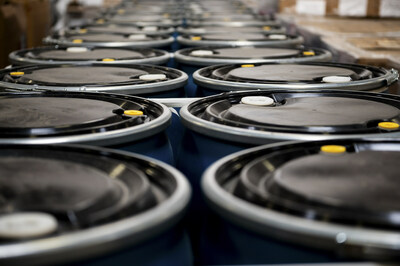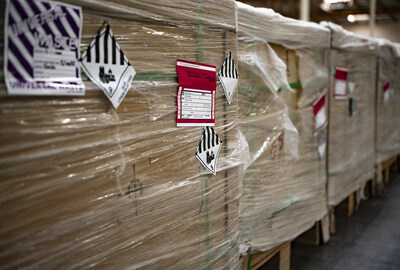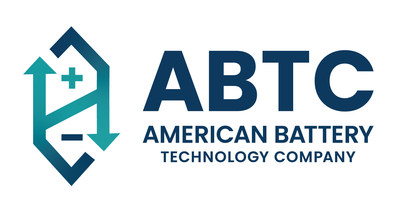Award to supplement capital expenditures to accelerate construction and commissioning of next-generation lithium-ion battery recycling facility to enable expanded North American closed-loop battery metals supply chain
RENO, Nev., April 4, 2024 /PRNewswire/ -- American Battery Technology Company (ABTC) (NASDAQ: ABAT), an integrated critical battery materials company that is commercializing its technologies for both primary battery minerals manufacturing and secondary minerals lithium-ion battery recycling, has been selected for an additional award of $40.5 million through the Qualifying Advanced Energy Project Credits program (48C) to support the design and construction of a new, next-generation, commercial battery recycling facility to be located in the United States. As with ABTC's initial $20 million tax credit award under the 48C program supporting the construction and buildout of its battery recycling facility in Nevada, this additional award was granted by the U.S. Department of Treasury Internal Revenue Service following a highly competitive technical and economic review process performed by the U.S. Department of Energy (DOE), which evaluated the feasibility of applicant facilities to advance America's buildout of globally competitive critical material recycling, processing, and refining infrastructure.

"ABTC and our partners have been engaging with nearly every major automotive OEM and battery cell manufacturer in the world to present the services we offer of domestic, low-cost, and low environmental impact recycling of lithium-ion batteries, the manufacturing of precursor materials, and the synthesis of refined materials such as high-recycled metal content high energy density cathode active material (CAM)," stated American Battery Technology Company CEO Ryan Melsert. "We are now at the point where we have more feedstock battery material for recycling under negotiations than can be processed in our current Nevada facility, and as a result we have been conducting preliminary design and site selection processes for our next commercial-scale recycling facility.
Melsert continued, "This next facility will be strategically aligned with our partner facilities in location and throughput, and we are excited to have received this support from the U.S. Government to apply these $40.5M in credits towards the accelerated construction and start of operations of this pivotal facility intended to significantly increase the Nation's capacity to manufacture domestic critical battery minerals."
ABTC is commercializing its internally-developed recycling process that utilizes an upfront strategic de-manufacturing process followed by a targeted chemical extraction train in order to recover battery materials with high yields, low cost, and a low environmental footprint. These ABTC recycling technologies have won several competitive corporate awards and government grants and are fundamentally different than conventional methods of battery recycling, which generally utilize either high temperature smelting operations or non-strategic shredding systems.
ABTC has been awarded over $60 million through the 48C program and over $70 million in U.S. DOE grants to support investment in the company's battery recycling and primary battery metals commercialization efforts to buildout a domestic battery metals circular supply chain.
ABTC is working to foster improved access to jobs for members of the community, including under-represented individuals and those facing barriers to employment, by leveraging U.S. DOE investments and through partnerships with workforce development and government agencies.
About American Battery Technology Company
American Battery Technology Company (ABTC), headquartered in Reno, Nevada, has pioneered first-of-kind technologies to unlock domestically manufactured and recycled battery metals critically needed to help meet the significant demand from the electric vehicle, stationary storage, and consumer electronics industries. Committed to a circular supply chain for battery metals, ABTC works to continually innovate and master new battery metals technologies that power a global transition to electrification and the future of sustainable energy.
Forward-Looking Statements
This press release contains "forward-looking statements" within the meaning of the safe harbor provisions of the U.S. Private Securities Litigation Reform Act of 1995. All statements, other than statements of historical fact, are "forward-looking statements." Although the American Battery Technology Company's (the "Company") management believes that such forward-looking statements are reasonable, it cannot guarantee that such expectations are, or will be, correct. These forward-looking statements involve a number of risks and uncertainties, which could cause the Company's future results to differ materially from those anticipated. Potential risks and uncertainties include, among others, risks and uncertainties related to the Company's ability to continue as a going concern; the inability to obtain permits required for future exploration, development or production, general economic conditions and conditions affecting the industries in which the Company operates; the uncertainty of regulatory requirements and approvals; fluctuating mineral and commodity prices; the failure to satisfy the prevailing wage and apprenticeship requirements of the tax credit; the failure to notify the U.S. DOE that the prevailing wage and apprenticeship requirements of the tax credit were met; the reduction or revocation of the tax credit due to the location of the project having materially changed, the occurrence of a significant change in plans from those submitted in the application to obtain the tax credit, the finding that the property included in the basis of property for the qualified investment isn't eligible for the tax credit, an IRS determination that a tax credit has been claimed for the same investment, the certification requirements aren't satisfied within two years, the date for placing the project in service was not met, the failure to notify the U.S. DOE that the project was placed in service, or if there are other violations of Section 48C tax law.. Additional information regarding the factors that may cause actual results to differ materially from these forward-looking statements is available in the Company's filings with the Securities and Exchange Commission, including the Annual Report on Form 10-K for the year ended June 30, 2023. The Company assumes no obligation to update any of the information contained or referenced in this press release.


 View original content to download multimedia:https://www.prnewswire.com/news-releases/american-battery-technology-company-awarded-additional-40-million-competitive-tax-credit-to-accelerate-construction-of-next-battery-recycling-facility-302108432.html
View original content to download multimedia:https://www.prnewswire.com/news-releases/american-battery-technology-company-awarded-additional-40-million-competitive-tax-credit-to-accelerate-construction-of-next-battery-recycling-facility-302108432.html
SOURCE American Battery Technology Company
![]() View original content to download multimedia:https://www.prnewswire.com/news-releases/american-battery-technology-company-awarded-additional-40-million-competitive-tax-credit-to-accelerate-construction-of-next-battery-recycling-facility-302108432.html
View original content to download multimedia:https://www.prnewswire.com/news-releases/american-battery-technology-company-awarded-additional-40-million-competitive-tax-credit-to-accelerate-construction-of-next-battery-recycling-facility-302108432.html









